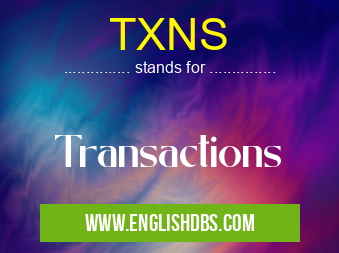What does TXNS mean in BANKING
TXNS stands for Transactions. This abbreviation is used to describe digital or real-world exchanges of goods, services, or money between two parties. Transactions are the backbone of most businesses and can take many forms. In this article, we will answer some frequently asked questions about transactions to help you better understand this essential concept.

TXNS meaning in Banking in Business
TXNS mostly used in an acronym Banking in Category Business that means Transactions
Shorthand: TXNS,
Full Form: Transactions
For more information of "Transactions", see the section below.
Essential Questions and Answers on Transactions in "BUSINESS»BANKING"
What is a transaction?
A transaction is an exchange of goods, services, or money between two parties. This could refer to a physical cash exchange at a store or the transfer of funds through credit cards, debit cards, ATMs, PayPal, Venmo, etc.
Are all transactions safe?
Not necessarily. While many businesses strive to ensure their transactions remain secure and confidential, there are risks associated with any online activity involving personal information and payment details. It is important to do your research before participating in any online transaction and only use vendors that have established reputations for data security measures such as encryption technology and identity fraud protection systems.
What taxes may be associated with a transaction?
Taxes vary depending on the nature of the transaction and the governing laws in the jurisdiction where it takes place. Generally speaking though, taxes may need to be paid in situations where goods are exchanged for money (sales tax), when goods are transferred from one state/country to another (import/export duties or tariffs), when money changes hands (income tax), etc.
Who regulates transactions?
Transactions typically fall under the purview of government agencies such as the Federal Trade Commission (FTC) in the US or other consumer protection organizations around the world. These institutions enforce laws designed to protect consumers from unfair or deceptive practices and they can investigate alleged violations of consumer rights related to transactions. Additionally, financial institutions such as banks also regulate transactions by enforcing pertinent anti-money laundering laws and other security standards relevant to monetary exchanges.
How do I resolve a dispute related to a transaction?
Disputes over transactions can arise for various reasons including fraudulent activities like identity theft or unauthorized payments; failure from either party to fulfill their contractual obligations; unsatisfactory conditions upon delivery; etc. In these cases, it's best to contact customer service representatives from both entities involved and explain your issue so they can discuss potential solutions together based on applicable regulations in each jurisdiction — though mediation services may need to be sought if no resolution can be found directly between parties involved in the dispute at hand.
Final Words:
Transactions play an integral role in today's business landscape and understanding them is key to operating successfully in our increasingly globalized economy. The questions discussed above provide just some basic information about this topic but further research should be conducted if you have more specific inquiries regarding your own dealings involving transactions of any kind — both online and offline environments alike!
